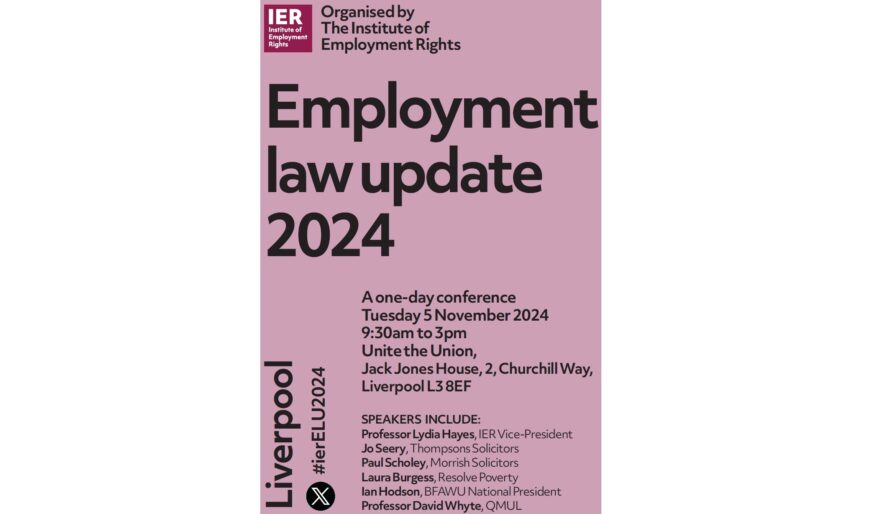Employment law update November 2024 (Liverpool)
Our highly popular annual update on statute, case law and employment rights in Liverpool

About the event
by Dave Hawkins
Another excellent and thought-provoking event from the IER, giving delegates an insight into the forthcoming employment rights changes from the new government.
IER Director James Harrison welcomed delegates and set the scene for the Institute’s first briefing since the election of a Labour government, bringing with it an opportunity to influence legislation and the rights of working people.
Following one of the presentations, James said the Bill was “like a Swiss cheese: full of holes” – an excellent observation.
The Employment Rights Bill – an analysis
IER Vice-President Professor Lydia Hayes gave an excellent summary of the Bill and highlighted opportunities and areas of concern.
In contrast to the last Labour government, the current one faces “widespread in-work poverty as opposed to unemployment”, as the welfare system had been used by the Tories effectively to subsidise employers paying low wages.
Unfair dismissal sees several changes in the Bill, including day-one rights, although the probationary period of employment – looking like nine months – is one of four areas of the Bill out for consultation. The two-year qualifying period remains for redundancy.
Lydia noted that around nine million workers would now have unfair-dismissal rights, and that there was expected to be a rise of around 3,500 extra such claims per year, in addition to the current number of around 20,000.
Lydia also discussed the introduction of sectoral bargaining for adult social care and school support staff and the need to spread this across the board. And she warned of the danger of employers turning to self-employed contracts and bringing forward capability dismissals for employees with less than two years’ service ahead of the rights coming into force in 2026.
Campaigning for a framework of labour law fit for the 21st century
BFAWU President Ian Hodson gave a passionate and informative presentation on the need to step up campaigning on trade-union rights.
Ian recalled how McDonalds had manipulated contracts of employment to enable them to retain the worst of zero-hours contracts and how the same pitfalls would still apply, despite the Bill.
He said that an organisation’s economic position should not be an excuse for treating working people badly and exploiting them. There was still the need to ban zero-hours contracts, have effective day-one employment rights and raise the minimum wage to at least £15 per hour.
The Socio-Economic Duty: a blow for equality
Laura Burgess of Manchester-based Resolve Poverty gave an excellent presentation, starting with an overview of the charity’s own role in “working locally to end poverty nationally”.
Laura explained how the Socio-Economic Duty (SED) – enshrined in Section 1 of the Equality Act 2010 – had never been implemented by the Tories, but was now back on the table as a Labour manifesto commitment.
The SED would oblige public bodies to adopt transparent and effective measures to address inequalities resulting from differences in occupation, education, place of residence or social class.
Laura outlined case studies showing how implementing the duty could raise the living standards of working people, including one from Merseyside Fire and Rescue using a bursary scheme to increase the number of firefighters coming from deprived areas. Some 195 people had taken advantage of the scheme, 48 of them from the most deprived areas of Merseyside.
Laura noted that there was no formal time-scale for implementing the SED, but the direction of travel appeared positive.
Day-one rights and probation
Jo Seery of Thompsons Solicitors focused on the issue of day-one rights and the probationary period.
After recapping the current legal position around dismissal and the two-year qualifying period, Jo’s excellent presentation covered the repeal of the qualifying enshrined in s108 of the Employment Rights Act, noting however that this was subject to a consultation on the length of the probationary period to be introduced – probably nine months.
Jo raised the important issue of trade unions using the new legal standards as a tool for collective bargaining, and noted that the new rights would not come into force until 2026.
Enforcing the Employment Rights Bill: learning the lessons of the past
Professor David Whyte of Queen Mary University of London gave another excellent and thought-provoking presentation, highlighting the key role that the new Fair Work Agency would have.
He pointed to the past failures – through under-resourcing – of enforcement organisations such as the Health and Safety Executive and HMRC, in bringing to book organisations that breach working people’s rights.
David said that organisations violating workings’ rights should lose any opportunity to receive public funding or contracts, and that penalties should be higher to discourage abuse, including an interesting proposal to introduce ‘equity fines’ on organisation.
Finally, this blogger’s view: It should not be the role of government to unduly influence either party in the free collective bargaining process, and the decades of anti-trade union legislation have continued to do this.
Working people should have the right to defend their hard-won terms and conditions by any means open to them, free from restrictive legislation biased towards the employers.
The day’s sessions all clearly illustrate and reinforce this principle: I for one look forward to the ‘Case Law’ session in Manchester next March.
Dave Hawkins: former TUC course co-ordinator for Merseyside
Download speaker presentations
- Hayes-ERB-analysis.pdf - 2.70 MB
- Burgess-Socio-Economic-Duty.pdf - 1.50 MB
- Seery-Day-One-Rights.pdf - 255.61 KB
- Scholey-Discrimination-law.pdf - 800.26 KB




